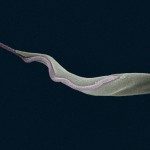Link to Pubmed [PMID] – 26266535
PLoS Negl Trop Dis 2015 Aug;9(8):e0003975
The parasitic flagellate Trypanosoma vivax is a cause of animal trypanosomiasis across Africa and South America. The parasite has a digenetic life cycle, passing between mammalian hosts and insect vectors, and a series of developmental forms adapted to each life cycle stage. Each point in the life cycle presents radically different challenges to parasite metabolism and physiology and distinct host interactions requiring remodeling of the parasite cell surface. Transcriptomic and proteomic studies of the related parasites T. brucei and T. congolense have shown how gene expression is regulated during their development. New methods for in vitro culture of the T. vivax insect stages have allowed us to describe global gene expression throughout the complete T. vivax life cycle for the first time. We combined transcriptomic and proteomic analysis of each life stage using RNA-seq and mass spectrometry respectively, to identify genes with patterns of preferential transcription or expression. While T. vivax conforms to a pattern of highly conserved gene expression found in other African trypanosomes, (e.g. developmental regulation of energy metabolism, restricted expression of a dominant variant antigen, and expression of ‘Fam50’ proteins in the insect mouthparts), we identified significant differences in gene expression affecting metabolism in the fly and a suite of T. vivax-specific genes with predicted cell-surface expression that are preferentially expressed in the mammal (‘Fam29, 30, 42’) or the vector (‘Fam34, 35, 43’). T. vivax differs significantly from other African trypanosomes in the developmentally-regulated proteins likely to be expressed on its cell surface and thus, in the structure of the host-parasite interface. These unique features may yet explain the species differences in life cycle and could, in the form of bloodstream-stage proteins that do not undergo antigenic variation, provide targets for therapy.
